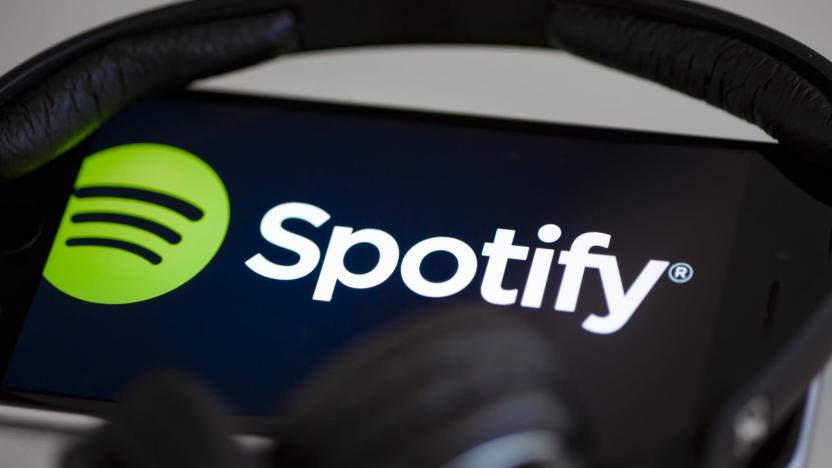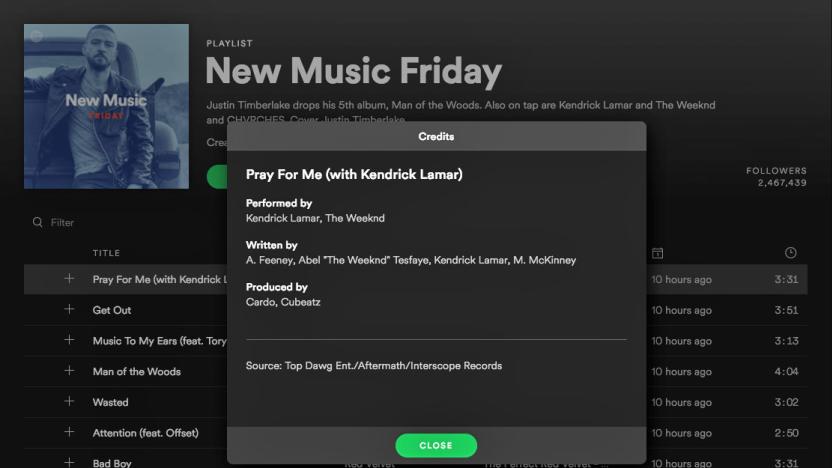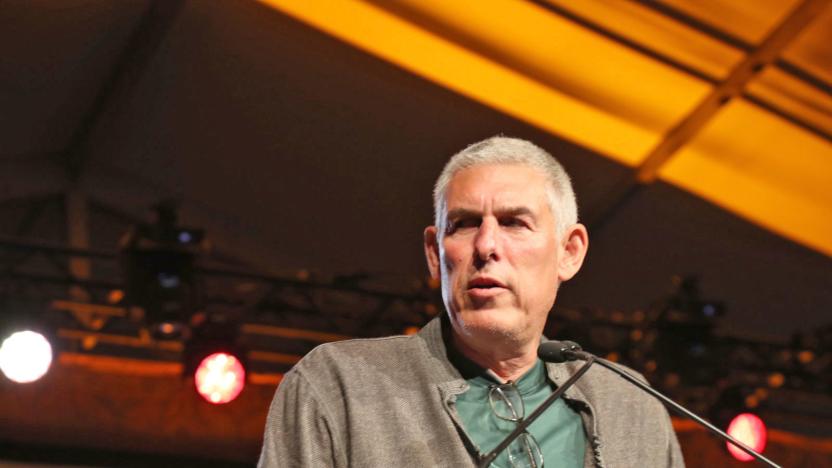musicindustry
Latest

Spotify opens up its streaming data to music publishers
Spotify seems to be focused on building stronger relationships with musicians, having added features such as easier music uploads and allowing them to submit tracks to playlist editors for consideration. It's made overtures to songwriters as well, including with its Secret Genius program and adding songwriter and producer credits. The latest effort to foster ties with the industry is Publishing Analytics, which the company says is "the first analytics tool from a music streaming service built specifically for publishers, so they can better serve their songwriters."

Spotify adds songwriter and producer credits to its iOS app
After adding songwriter and producer credits to its desktop app in February, Spotify has made it easier to find out more details about tunes you're listening to on the go by bringing credits to the iOS app. Starting today, when you tap the options button on a song (the ellipsis on the right of the screen), you can view the credits, though only if record labels have provided those details, Music Business Worldwide notes. There's no word as yet on when credits will arrive in the Android app.

Spotify now shows songwriter and producer credits
Spotify announced today that when listening through the desktop platform, users will now be able to view song credits. Starting now, right-clicking on a track and selecting "Show Credits" from the menu will bring up its performer, writer and producer credits as well as the source from which that info was provided. Spotify says that currently, those details have been compiled from record label-provided metadata and they may be incomplete in some cases, but going forward, the feature will become more functional and will use information from other sources.

YouTube music head says company pays higher royalties than Spotify in US
Making a living from streaming royalties is tough for music artists, and YouTube has had one of the worst reputations in the music industry for a while. Even Lyor Cohen, the current head of YouTube Music, knows that many are skeptical about the service's ability to pay out a legitimate rate. Cohen wrote a blog post on Thursday to explain why he thinks that YouTube deserves another chance, and that his company is the highest paying music streaming service out there.

YouTube hopes to patch things up with the music industry
The music industry hasn't been too enamored with YouTube, what with all the unsanctioned content on the video site. Now that Google is planning to merge Google Play and YouTube into one music service, however, it's time to start fixing that awkward relationship. YouTube's head of music, Lyor Cohen, took the first steps toward reconciliation at the New Music Seminar in New York City this week, with a panel geared toward the lack of ad revenues and how the music industry can be more supportive of streaming services.

Spotify's 'Secret Genius' may help smooth things over with songwriters
Spotify announced the launch of Secret Genius today -- a global, songwriter-focused initiative that will highlight the contributions of those working behind the scenes in the music industry. It's a move that acknowledges members of the music world that Spotify has had a contentious relationship with in the past.

Streaming topped all forms of US music consumption in 2016
Remember in early 2013 when Apple hit 25 billion iTune song downloads? And Tim Cook said it took Sony 30 years to sell 220,000 Walkmans? Well, fast-forward just under four years, and Nielsen has revealed that Americans streamed 431 billion songs in 2016 alone, surpassing total digital sales of songs and albums for the first time in history. "The landscape is evolving even more quickly than we have seen with other format shifts," said Nielsen SVP David Bakula.

Paid streaming services provide a big boost to the music industry
Streaming continues to play a bigger role in music industry revenue and now it's starting to provide some real help offsetting declining album sales in the US. In its mid-year report, the Recording Industry Association of America (RIAA) reports that the industry saw its biggest growth in the first half of 2016 since the 1990s, up 8.1 percent year-over-year to $3.4 billion. In terms of music streaming as a whole, revenue from those services was up 57 percent during the first half of the year and it now makes up 47 percent of the music industry's total revenue. That's up from 32 percent of the total revenue this time last year.

No one has a platinum album in 2014
The decline in album sales is certainly nothing new, thanks to the smattering of streaming options now available to eager listeners. However, 2014 looks to be particularly awful. Forbes reports that nearly 10 months into the year, no release since January has yet to reach platinum status -- a release that sells 1 million copies (in the US). What's more, only one has sold a million copies: the Frozen soundtrack that hit shelves last year. At this point in 2013, five different albums had hit that sales mark (Justin Timberlake's The 20/20 Experience led the pack). How bad are the numbers? Well, the best-selling effort that was actually released in 2014 is fourth on the year's sales tally (Eric Church's Outsiders). And singles are seeing the same fate, albeit at a slower pace. So far, 60 tracks have sold a million -- down from 83 at this point last year. As Forbes points out, sales usually see a boost during Q4 (holiday bump), but most of the top sellers like Adele, Katy Perry and others don't have new material on tap before the year's end. However, Taylor Swift's 1989 is set to release on October 27th, so there's hope? [Photo credit: Gabe Souza/Portland Press Herald via Getty Images]

Editorial: RIAA takedown requests and ad complaints are missing an opportunity
As noted here, the RIAA has issued 10 million takedown requests to Google in an attempt to close off paths to sites that facilitate music downloading. At the same time, a related phenomenon is fueling the fire of rightsholder outrage: Brand advertising that appears on download sites and generates revenue for those businesses. These two aspects of the internet's ecosystem -- finding free music downloads through search engines, and ad-supported sites expediting illicit music acquisition -- represent deeply rooted challenges to media owners. At the same time, as with most challenges, there is a flip side of opportunity. The difference between capitalizing on an opportunity and being defeated by its challenge is the difference between getting in front of reality and falling behind it. The RIAA is regarded by many as the poster organization for denial of reality. A reversal of strategy and tactics might get big media owners in front of 21st century realities.

Deezer announces ambitious global rollout, ignores US and Japan
Deezer added a few notches to its music streaming belt yesterday, with the announcement of its long awaited rollout to (nearly) every corner of the globe. The launch, confirmed at Le Web in Paris yesterday, has already brought the service to both Ireland and the Netherlands, with plans to expand across Europe by the end of this month. Users in Canada and Latin America can expect to receive the French service by the end of January, Australia and Africa should see it by the end of February, and everyone else by the middle of next year. Conspicuously absent from that list are the US and Japanese markets, both of which have been passed over "due to market saturation and low growth forecasts," as well as the fact that the two countries comprise "only" 25 percent of worldwide music consumption. Le sigh. [Thanks, Paulo]

Apple's iCloud bags last major record label, will cost $25 / year to sign up?
We'd heard that Universal was the only holdout, and now CNET says the deal is done -- Apple has reportedly signed all four major record labels for its upcoming iCloud service. We'll be bringing you all the confirmed details on June 6th, but while you wait, here's some food for thought: the Los Angeles Times says that Apple will eventually charge somewhere around $25 a year for a subscription to the cloud. That will help supplement the 58 percent piece of the pie it's planning to take from the music industry for songs distributed though the network, and possibly some ad revenue as well. 30 percent will reportedly go to the labels, and another 12 percent to publishers, who will apparently be signing their own agreements with Apple tomorrow. Update: There's actually an interesting discrepancy between the two sources here: the LA Times reports that Apple's taking that nice, juicy 58 percent, but CNET says that the labels will take 58 percent while Apple claims its traditional 30 percent instead. We're investigating. Update 2: The LA Times has updated its piece, with different percentages still -- reportedly, Apple will take 18 percent, publishers get 12 percent, and labels 70 percent of the proceedings.

Bon Jovi says Steve Jobs killed music business
Is Steve Jobs music's savior, or is he the angel of death? Jon Bon Jovi cast his vote in The Sunday Times Magazine; the American rock musician thinks Jobs is "killing" the music industry with iTunes. The massive success of iTunes, says Bon Jovi, has caused the "magical" experience of buying records in a store to disappear. "Kids today have missed the whole experience of putting the headphones on, turning it up to 10, holding the jacket, closing their eyes and getting lost in an album; and the beauty of taking your allowance money and making a decision based on the jacket, not knowing what the record sounded like, and looking at a couple of still pictures and imagining it," the rocker told The Sunday Times Magazine. Bon Jovi says that "in a generation from now people are going to say: 'What happened?' Steve Jobs is personally responsible for killing the music business." I am not sure the record industry would completely agree with Bon Jovi's assessment of the situation. Labels and recording artists have sold more than 10 billion songs through Apple's music store since it launched on April 28, 2003. Today, the iTunes Store is the top music vendor in the United States and has proven to be a worthy competitor to the illegal peer-to-peer and music download services that preceded it.

Jon Bon Jovi accuses Steve Jobs of putting a shot through the heart of music
Steve Jobs, according to musical legend Jon Bon Jovi, is "personally responsible for killing the music business." This strident (and economically false) accusation comes from an interview he conducted with Britain's Sunday Times, where he candidly sets out his dismay at this century's move away from music distribution on physical media and toward ubiquitous download portals. Bon Jovi's nostalgia shines through in his detailed account of the "magical" experience of picking up records and enjoying their sweet touch and soothing analog tones -- though we're not sure how he missed out on the fact that CDs, not downloads, were the first to stab a dagger of digital convenience through the hole in his record collection. Still, Bon Jovi thinks Apple's iTunes success is to blame for the loss of our collective innocence and bright-eyed enthusiasm for music. What do you think?

Apple informs labels that iTunes song previews will be 90 seconds long, hopes they don't mind?
It's all up there in black and white, but we'll be happy to spell it out again here -- it seems that Apple has decided to extend the length of iTunes song previews from 30 seconds to 90 seconds. Sounds just fine to us, but not to the recipients of this letter, who are told the change is happening whether they like it or not and it's for their own good. "We believe that giving potential customers more time to listen to your music will lead to more purchases," the document reads, but without giving the music labels any way to say no. We don't actually know the origin of this particular document, so we're not saying this is a done deal by any means, but if the letter's legit you're looking at the world's largest online music store telling the labels to put up and shut up -- or else peddle their tunes somewhere else. Update: It's worth noting that CNET reported that iTunes song previews might double in length about two months ago.

RIAA finds its soul, will stop suing individuals downloading music
When you retard fair use with pointless DRM and then sue anonymous children for illegally downloading music while ignoring those of the execs at the top of the music industry, well, you're asking for a public relations nightmare. Now, with more than 35,000 lawsuits to its credit, the RIAA says it will finally end the legal assault against consumers that began back in 2003. The Recording Industry Association of America will instead, focus its anti-piracy efforts with ISPs. Under the new plan, the RIAA will contact ISPs when illegal uploading is detected. The ISP will then contact the customer with a notice that would ultimately be followed by a reduction or cessation of service. As you'd expect, the RIAA is not commenting on which ISPs they are in cahoots with. The RIAA also says that it won't require ISPs to reveal the identities of individuals but could, of course, go after individuals who are heavy uploaders or repeat offenders. For the moment though, it appears that single-mothers are in the clear.

Amazon readying DRM-free online music store?
Oh boy, we're sensing an all-out war. Of course, the tables are slanted mighty heavily in favor of Apple, but it sounds like Amazon is up to the challenge of stealing some of the digital download market share that Cupertino currently owns. According to the UK's TimesOnline, Amazon is ready to "to launch an online music store next month," and while music execs never thought they'd see the day, this service too should have "reduced protection against copyright infringement." In short, the (hopefully) forthcoming service will serve up at least some DRM-free tracks as Apple's iTunes already does, and as expected, a vast majority of the free and clear music will come from EMI and various other "independent labels." Interestingly, it was stated that Amazon hoped to have the service live "by next month," but it was still unclear as to whether it would meet that goal. No word on whether this service will attempt to undercut iTMS' $1.29 per DRM-free track, but a little competition never hurt anybody, right?[Via ArsTechnica]

Music execs chime in on DRM: it's lame, but it ain't going anywhere
A recent poll conducted by Jupiter Research of European music firms reveals that DRM isn't exactly universally popular, not even in these bastions of all that is unholy and restricted. In the poll, 54% of executives thought DRM systems were too restrictive, and 62% believe dropping DRM would boost the "take-up" of digital music. That number varied dramatically based on who was being asked, with only 48% of record label execs thinking DRM would boost download sales, but 58% believing so at major labels, and outside the labels the executives seemed much wiser to the ways of the consumer, with 73% believing the death of DRM would boost sales. Unfortunately, nobody much seems to think the end is near. Says analyst Mark Mulligan: "Despite everything that has been happening the record labels are not about to drop DRM, even though all they are doing is making themselves look even less compelling by using it." Execs do seem to think DRM needs to be more interoperable, with 70% thinking that downloads need to play in as many players as possible in the future, but 40% think it's going to take concerted government and consumer action to make this happen -- not quite a rosy picture. This poll was conducted before all these recent Steve Jobs shenanigans, so perhaps the opinions have shifted since then, maybe even for the better, but we won't get our hopes up.[Thanks, David]







